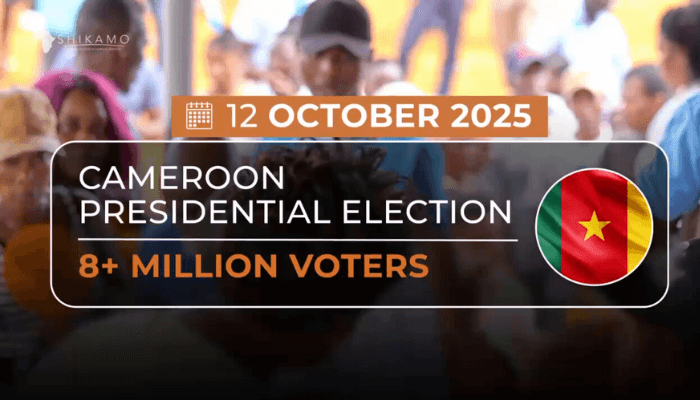Cameroon votes: Key facts about Sunday’s presidential election
Cameroon will hold its presidential election tomorrow Sunday, October 12, as millions of citizens prepare to choose their next leader amid economic hardship, insecurity, and growing public frustration with the state of governance.
For many in the cocoa- and oil-producing Central African nation, the election is seen as a test of whether genuine political change is still possible, less about party politics and more about restoring stability and confidence in the country’s democratic process.
Read also: Cameroon heads to the polls as world oldest ruler seeks to extend 43-year rule
A nation at a crossroads
Cameroon has had only two presidents since independence from France and the United Kingdom in 1960. Paul Biya, now 92, has been in power since 1982, having previously served as prime minister. His tenure has been marked by relative political stability compared with some of its neighbours, but also by widespread allegations of corruption, human rights abuses, and an absence of political renewal.

The country’s demographics underscore that tension, of Cameroon’s estimated 30 million citizens, around 60 percent are under the age of 25, and more than half have never known another leader.
Economic frustration runs deep. Food and fuel prices have risen sharply, youth unemployment remains high, and the Anglophone regions in the northwest and southwest continue to experience violence from separatist groups seeking independence.
Read also:Group says Akwa Ibom loses 2,560 oil wells to Cameroon
Who is running?
Twelve candidates are competing in Sunday’s vote, but the political landscape is heavily tilted toward the ruling Cameroon People’s Democratic Movement (RDPC).
Paul Biya (RDPC): The incumbent and most dominant figure in Cameroonian politics. Despite his age and prolonged absences abroad, Biya remains firmly in control of the state apparatus. If he wins, he will serve until nearly 100.
Akere Muna (Univers Party): A barrister and former vice-president of Transparency International, known for his anti-corruption stance. Muna is campaigning on restoring trust in institutions and ending the Anglophone crisis.
Cabral Libii (Cameroon Party for National Reconciliation): A 45-year-old journalist and one of the youngest figures in the race. Libii has focused on governance reform and economic opportunity for young people.
Joshua Osih (Social Democratic Front): An Anglophone politician promising to “liberate” Cameroon from entrenched one-party rule and negotiate an end to the conflict.
Hermine Patricia Toimaino Ndam Njoya (Democratic Union of Cameroon): One of only three women ever to contest a presidential election in Cameroon, she is campaigning for inclusion, education and local governance reform.
Bello Bouba Maigari (National Union for Democracy and Progress): A veteran politician and former tourism minister, running on a message of national unity.
Issa Tchiroma Bakary (Front for the National Salvation of Cameroon): Former employment minister, positioning himself as a reformer despite being part of the establishment.
The main opposition figure from 2018, Maurice Kamto, who officially won 14 percent of the vote, has been barred from running after an allied party faction registered its own candidate.
How the election works
The presidential election operates under a first-past-the-post system — meaning whichever candidate receives the most votes wins outright. There is no second round.
Voting is organised by Elections Cameroon (ELECAM), an ostensibly independent electoral body created in 2006, though its impartiality has often been questioned due to the dominance of presidential appointees in its leadership.
Read also: Insurgency: Plan underway to deploy troops around Nigeria/Cameroon border town – Zulum
Roughly 8.2 million Cameroonians aged 20 and above are registered to vote. However, turnout is expected to vary sharply across regions. In the last election, participation exceeded 50 percent in Francophone areas but dropped below 16 percent in Anglophone regions, where insecurity and distrust in the process discouraged voters.
Challenges ahead
Under Biya’s rule, Cameroon has faced persistent corruption, slow growth, and a concentration of power in the presidency. The removal of term limits in 2008 sparked widespread protests, but the change allowed Biya to seek an indefinite number of seven-year terms.
Analysts warn that the country could face a succession crisis if Biya’s health fails while in office. With no clear heir apparent and elite rivalries simmering beneath the surface, questions about the country’s future leadership remain unresolved.
Despite being rich in resources such as oil, gas, and cocoa, and with the World Bank projecting GDP growth to rise from 3.5 percent in 2024 to 3.9 percent in 2025, driven by higher global cocoa prices, increased cotton output, and improved electricity supply for businesses — much of the population has seen little improvement in living standards.
A test for democracy
For many Cameroonians, the election is less about who wins and more about whether the process itself can be trusted. Allegations of electoral irregularities have dogged every vote since the 1990s, and opposition parties fear that 2025 will be no different.
“I keep hoping for a better Cameroon where young people can find work,” said Boris, a computer engineer in Buea, “I imagine a day when Cameroon looks like Paris, with affordable education and safe roads.”

